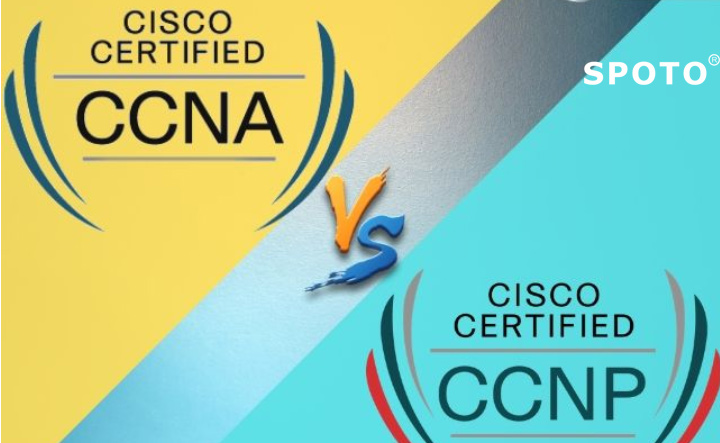Cisco Systems, Inc. offers world-class networking and communications products and services. The most popular products include routing and switching products which help in directing data, voice and video traffic across networks around the world. There would be five levels of network certification and each level would be required a candidate to pass one or more exams. Also, it wouldn’t be an easy task, so it is recommended to you to have the training courses offered by the SPOTO Club.
Cisco Certification Levels
Entry Level
The entry-level certifications include two credentials — CCENT (Cisco Certified Entry Networking Technician) and CCT (Cisco Certified Technician). Both certifications serve as the starting point for a successful career in networking.
Associate Level
The two Associate Level certifications include CCDA (Cisco Certified Design Associate) and CCNA (Cisco Certified Network Associate). These credentials would be proving your skills which would be necessary to successfully manage state-of-the-art network solutions.
Professional Level
The two professional-level certifications — CCDP (Cisco Certified Design Professional) and CCNP (Cisco Certified Network Professional) recognize a candidate’s knowledge and skills regarding more advanced networking.
Expert Level
There are two expert-level certifications — CCIE (Cisco Certified Internetwork Expert) and CCDE (Cisco Certified Design Expert). These certifications would be allowing the candidates for assessing the expert level infrastructure network design skills worldwide.
Architect Level
The highest level of accreditation is the Architect level certification would be CCAr (Cisco Certified Architect). It is going to be showcased the formal knowledge of Cisco technologies and infrastructure architecture.
CCNA
CCNA certifications are the most sought after career credentials that demonstrate an individual’s ability to install, configure, operate and troubleshoot routed and switched networks. CCNA certifications would be available in eight prominent areas namely: Cloud, Collaboration, Data Center, Industrial/IoT, Routing and Switching, Security, Service Provider, and Wireless.
CCNP
CCNP is an intermediate level certification that is aimed at professionals who work with local or wide area network (LAN or WAN) infrastructure. This certification would be demonstrating an individual’s ability to planning, implementing, verifying and troubleshooting LANs and WANs. CCNP certifications cover seven different domains namely: Cloud, Collaboration, Data Center, Routing and Switching, Security, Service Provider, and Wireless.
CCNA vs. CCNP
CCNA is considered to be an Associate level certification whereas CCNP is considered to be a professional level Cisco certification.
CCNA wouldn’t be required to have any prerequisite for undertaking the exam while CCNP would be requiring a candidate to be either certified in CCNA or possess a CCIE certification in any track to achieve it.
CCNA certifications can be earned by passing any two exams depending on the subject of the program, while CCNP certifications, except Routing and Switching, require a candidate to pass at least four exams. The Routing and Switching credential would be earned by clearing three exams.
CCNA certifications would be offering basic knowledge of networking while CCNP certifications would be providing detailed knowledge of advanced networking technologies.
The job roles offered post CCNA certification include Network Technician, Network Support Engineer, Helpdesk Engineer, and Service Desk Engineer.
Since CCNP certifications are earned only after earning a CCNA certification, CCNP certifications offer a higher salary than CCNA certifications.
Conclusion
If we take a look at the scope that these certifications would be offering, both serve as a great career move for anybody. CCNP would be having the capability of increasing your career growth manifolds. So, if a professional would be already CCNA certified then there shouldn’t be any delay in earning a CCNP certification for exploring more opportunities.
So, whether you gain any of the certifications, your best bet to achieve it would be through the prep courses which are being offered by the SPOTO Club. They have 16 years of experience, which would help you out throughout your journey.
More Recommended Articles
1. The CCNA Basic: What are ACLs?
3. The CCNA Basic: EIGRP Overview
4. What Is the Best Microsoft Certification to Get?
5. Everything You Ever Wanted to Know About CCIE
The Latest Passing Report from SPOTO

 Join Telegram Study Group ▷
Join Telegram Study Group ▷















